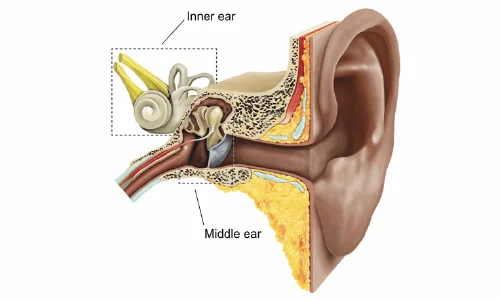- Home
- /
- Treatments
- /
- Stapedectomy Surgery in Ghaziabad
Stapedectomy Surgery inGhaziabad
What is a Stapedectomy Surgery?
Stapedectomy surgery is performed to improve hearing in individuals with otosclerosis, a condition where abnormal bone growth in the middle ear prevents the stapes bone from vibrating properly.
This surgery removes the stapes bone and replaces it with a prosthesis to restore the transmission of sound waves in our ears. Without timely treatment, otosclerosis can lead to progressive hearing loss and associated complications.
Hearing loss can greatly diminish your quality of life, disrupting communication and everyday activities. If your hearing loss is caused by otosclerosis, stapedectomy surgery might be a highly effective treatment. Consult the top ENT specialists for stapedectomy surgery at the CK Birla Hospital.
Stapedectomy Surgery in Ghaziabad

Different Stages of Otosclerosis
| Initial Stage: Mild Hearing Loss and Occasional Tinnitus |
Progressive Stage: Worsening Hearing Loss and More Frequent Tinnitus | Advanced Stage: Significant Hearing Impairment |
| Patients often experience mild hearing loss that may not be immediately noticeable.
It typically starts with difficulty hearing low-pitched sounds or whispering. Some patients may experience occasional tinnitus, which is a ringing or buzzing noise in the ears. |
Patients find it increasingly difficult to hear normal conversations, especially in noisy environments.
Tinnitus also becomes more frequent and persistent, which can be quite frustrating & distressing.
Abnormal bone growth in the middle ear is more significant, leading to further immobilization of the stapes bone and reduced sound transmission. |
Hearing loss is severe and significantly impairs the patient’s ability to communicate effectively.
Constant presence of tinnitus can further exacerbate the difficulty in hearing and understanding speech. Quality of life is markedly affected. Surgery, becomes crucial to restore hearing and improve overall well-being. |
Types of Stapedectomy Surgery
- Traditional Stapedectomy: Complete removal of the stapes bone and replacement with a prosthesis.
- Partial Stapedectomy: Only a portion of the stapes bone is removed and replaced with a prosthesis.
- Laser Stapedectomy: Use of a laser to precisely remove the stapes bone and position the prosthesis.
Complications of untreated Otosclerosis
- Progressive Hearing Loss: Continued deterioration of hearing ability leading to social isolation.
- Tinnitus: A condition that involves a persistent ringing or buzzing in the ears.
- Balance Issues: Dizziness and balance problems are clearly indicative of severe damage.
- Communication Difficulties: Struggles with everyday communication and social interactions.
- Psychological Impact: Increased risk of anxiety and depression due to hearing impairment.
Preventive Measures Against Otosclerosis
- Regular Hearing Tests: Early detection through routine hearing examinations helps prevent severe damage.
- Protect Ears from Loud Noises: Protecting the ears in noisy environments help keep the condition from escalating.
- Avoid Ototoxic Medications: Be cautious with medications that can affect hearing.
- Genetic Counseling: For those with a family history of otosclerosis, genetic counseling may be beneficial in managing the symptoms and preventing the condition from accelerating.
Top Stapedectomy Specialists in Ghaziabad
How is Otosclerosis Diagnosed?
For accurate detection of otosclerosis, a physical examination by an ENT specialist is required. The doctor will review your medical history and may analyze the condition based on the following tests:- Audiometry (hearing test)
- Tympanometry
- CT (Computed Tomography) Scan
Pre-Treatment/Surgery Instructions
- Follow the doctor’s instructions for medication.]
- Avoid consumption of alcohol and tobacco.
- Doctors often instruct avoiding food or drink 8 hours prior to surgery.
- Make sure you have a caregiver with you post-surgery.
Post-Surgery Instructions
- The patient will be observed for a few hours post-surgery.
- Hospital discharge typically occurs on the same day or the next day, depending on the surgery type and recovery progress..
- Post discharge timely follow-ups will be scheduled to actively monitor recovery.
- Avoid heavy lifting and strenuous activities for a few weeks.
Recovery After Stapedectomy Surgery
Recovery time depends on the type of surgery performed. Generally, patients can expect:- Initial recovery within 1-2 weeks of stapedectomy
- Full recovery and improvement in hearing within 6-8 weeks.
- The ability to perform daily tasks improves significantly after the initial recovery phase
Be a super-mom, stay informed about pregnancy health updates with our weekly newsletter
[contact-form-7 id=”16292″ title=”Subscribe”]
FAQs about Stapedectomy Surgery
What is the Average Cost of Stapedectomy Surgery?
- Traditional Stapedectomy: Typically ranges from
- Partial Stapedectomy: Generally costs between
- Laser Stapedectomy: Can range from
Advantages of Minimally Invasive Surgery Over Traditional Open Surgery
| Aspect | Minimally Invasive Surgery | Traditional Open Surgery |
| Incisions | Smaller incisions | Larger incisions |
| Recovery Time | Shorter recovery period | Longer recovery period |
| Pain and Scarring | Less pain and minimal scarring | More pain and noticeable scarring |
| Hospital Stay | Shorter hospital stay | Longer hospital stay |
| Infection Risk | Reduced risk of infection | Higher risk of infection |
How long does stapedectomy surgery take?
Stapedectomy surgery typically takes about 1-2 hours, depending on the complexity of the procedure and the individual patient’s condition.
Will I need to stay in the hospital overnight?
Patients are mostly discharged on the same day of the surgery. The duration of the hospital stay may vary based on individual circumstances.
How soon can I return to normal activities after stapedectomy?
Patients can usually return to light activities within 1-2 weeks, but full recovery and return to normal activities may take up to 6-8 weeks. Avoid lifting heavy things.
Can otosclerosis recur after stapedectomy?
While stapedectomy surgery is highly effective, otosclerosis can occasionally recur. Regular follow-up with your ENT specialist is recommended to monitor your condition.
What should I do if I experience dizziness after the surgery?
Mild dizziness is common after stapedectomy surgery. However, if you experience severe or prolonged dizziness, contact your surgeon or healthcare provider immediately.
Is stapedectomy covered by insurance?
Most health insurance plans cover stapedectomy surgery, but coverage may vary. When planning the surgery, make sure to check with your insurance provider.
If you are considering stapedectomy surgery at the CK Birla Hospital is here to provide you with expert care and support. Contact us to schedule a consultation with our experienced ENT specialists.





